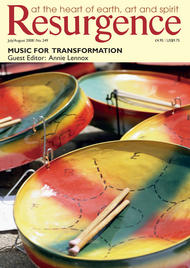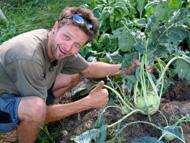LAST YEAR A small community dedicated to the practice of permaculture won their appeal to live on their land in South Devon, England. This hard-won achievement in the face of some deeply rooted opposition is an acknowledgement by the planning authorities of the pressing need for a new perspective on sustainable living. The community at Landmatters at Allaleigh are young, unmoneyed and committed to living lightly, to enrich rather than exploit the Earth. To find out more I visited their site earlier this year.
The Landmatters site consists of forty-two acres, set on a hill; mainly old pasture with woodland sloping deeply to a boundary stream. There are about eight households, all living in ‘benders’ (best described as an upturned basket of woven branches, covered with textiles and tarpaulins). Parking at the bottom of the hill, I was met by Oli, and we walked up over the pasture already being planted with trees, past the chickens in their sunny winter run and onto the main field with most of the benders, all tucked close to existing hedges and fronted with individual food gardens.
Oli explained the history of the community, beginning with the opportune purchase of the land and the formation of the group, whose permaculture training gives them their collective ethos. Each household is engaged in earning a living in its own right, as well as joining in collective enterprises: cultivating a shared vegetable garden, building a beautiful barn of timber from the site and constructing the bender for communal activities. Every individual brings specific skills to the group, including woodcraft and forestry, creative education and acupuncture – all grounded in the practice of permaculture.
Permaculture not only embraces the practices of traditional organic gardening, but goes several steps further in informed action. Originating in Australia, where Bill Mollison reviewed the folly of following European-style practices in a semi-arid tropical climate, the principles have been adopted worldwide, since it is the design philosophy that informs the practice. Nothing is ever done as simply expedient, towards solving an individual’s own immediate needs, since no one action has a single outcome; so a level of efficiency and environmental benefit accrues with every undertaking.
The permaculture gardens at Allaleigh have been made as raised beds by digging out a good spit of turf and upending it to one side, with a mulch of cardboard and compost both between the turves and on the surface. The trench between the beds becomes the path and the bed gives deep, untrampled soil. The old pasture of the site lies on a thin schisty soil that benefits from green manuring and the supplies of well-rotted horse manure from a nearby stableyard. Oli regretted that there were so few stones in the soil since harvesting them while tilling can furnish good paths.
One of the community is developing a market garden, acquiring a splendid collection of old-fashioned lights – panes of glass held together with robust wire clips. These stand up to the present windy conditions of the site and at the start of February he was already harvesting red and green lettuce, purslane, rocket and corn salad, started off in a very modest greenhouse on the south-facing wall of the barn. Many small hedges have already been planted, both for windbreak and fruit production; in a few years’ time the growing conditions in the field will have substantially changed character. Grassy areas are scythed, as early in the day as possible since cool grass stands firmer against the cut. Before the changes initiated by Landmatters the land supported beef cattle; now it provides for much more than dinners for distant tables.
Water is as essential as food and shelter and the community have installed a borehole with an efficient handpump; a storage tank stands nearby. At the other end of the site the rainwater is harvested from the roof of the barn before being cleaned by charcoal filters. Last summer that supply alone could have furnished the community with all their water needs. One of the benders lies below the barn, thus benefiting from a gravity-fed water supply. Living as they do, the residents of Allaleigh demonstrate how frugal human needs can be, and see the results of their light living as a potential gift to the wider community, as pressure on Earth resources makes changes essential.
Enrichment as opposed to exploitation is equally obvious in the management of woodland. Landmatters’ wood drops down the north-west side of the hill with many fine oaks, accompanied by holly, hazel and birch – though Oli with his woodsman’s eyes pointed out that not that many of them would make good building material since they are full of twists and burrs. He has embarked on thinning the wood, since regenerating and coppiced woodland provide better for a hand-tooled supply of fuel; in his experience there are many unmanaged and unproductive areas of woodland in England, a resource as yet unrecovered. Many trees are being planted at Landmatters, with a planned extension of the wooded areas, but of course these will take longer to mature than the proposed three years afforded the group by the planning permission to prove the project’s sustainability. Here permaculture’s long-term vision highlights the inadequacy of production and consumption as the prevailing economic model. While native trees are planted for woodland, Oli thinks that the food garden will need a wider range of fruiting trees from other ecosystems; the climate of south Devon is readily adaptive, with mild winters and moderate rainfall.
New approaches to living on the land are urgently needed since southern England suffers from the stresses of inflated land values, the displacement of the younger generation, and attitudes to building that are caught between obsolescing industrial farming and the romanticised view of a relocated urban population. The persistence and creativity of the permaculture community at Landmatters shows that this is one solution that deserves recognition.
Brigitte Norland lives and gardens in Devon.
Courses at Landmatters in 2008 include Introduction to Felting, 11th–13th July; Weaving Day, 26th July; Scything, 9th–10th August. For more information please visit








